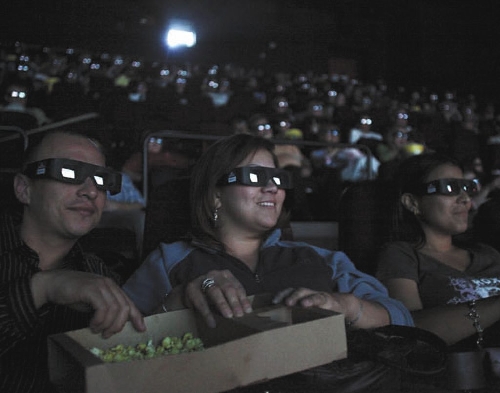Moviegoers appear quite happy to pay the price for 3-D





To 3-D or not to 3-D.
For moviemakers — and moviegoers — it’s not much of a question anymore.
Not with almost three dozen 3-D movies scheduled for release in 2011 — including such highly anticipated summer heavyweights as the "Harry Potter" franchise finale, the latest "Pirates of the Caribbean" and "Transformers" sequels, and the comic-book adventures of Thor, Green Lantern and Captain America. (Animated heroes get into the act, too, from the talking vehicles of "Cars 2" to the martial-arts menagerie of "Kung Fu Panda 2.")
From 2009 to 2010, box-office grosses for 3-D features increased 91 percent, accounting for $2.2 billion of the $10.56 billion in tickets sold at North American theaters.
In part, that’s because of higher ticket prices for 3-D releases.
Yet many moviegoers don’t seem to mind paying extra — in Las Vegas, most theaters charge between $3 and $4.50 more — for the privilege of watching movies with an extra dimension.
Some audience members don’t even wait for the movie to start.
At a recent promotional screening of the animated "Rio" at the Palms’ Brenden Theatres, 12-year-old Madi Kessler donned her black Dolby 3-D glasses long before showtime.
Sure, 3-D movies cost more, she said, but "I don’t really mind as long as it’s a good movie."
After all, when she’s watching a 3-D movie, "I like that it pops out," Kessler explained. "Instead of being on the sidelines, you’re actually in it."
In the case of "Rio," that means flying high with the movie’s tropical bird characters, who explore the title Brazilian city, from Copacabana Beach to Sugarloaf Mountain, through soaring 3-D animation.
That immersive experience also draws 23-year-old Mario Diaz to 3-D movies.
But only "A" movies: animation and action. And especially "Avatar," the top-grossing movie in box-office history, which was the first 3-D movie Diaz — and millions of fellow moviegoers — saw.
As far as 6-year-old Delacey White is concerned, watching "Rio" in 3-D "was awesome."
And if it were up to Delacey’s father, DeLouis , he’d watch "anything in 3-D," he said. "I just like the reality of it."
"With the four of us, it’s 50-some dollars," wife Kareema White acknowledged of the added cost, "but as long as it’s 3-D, we’re very much interested."
And the White family is hardly alone, according to local theater operators.
The National Association of Theatre Owners reported that, in 2010, 3-D ticket sales accounted for about 21 percent of the total box-office take of almost $10.6 billion.
But at Galaxy Theatres, which operates the 14-screen multiplex at the Cannery in North Las Vegas, 3-D movies totaled 31 percent of the chain’s 2010 total ticket sales, according to Galaxy President Rafe Cohen.
"At that point, you’re almost at a third of viewers going to 3-D," he pointed out. "We see no sign of 3-D fatigue."
Customers at Rave Motion Pictures’ Town Square 18 have expressed few complaints with 3-D, reported Jeremy Devine, Rave’s vice president of marketing.
And not even higher ticket prices have discouraged local moviegoers, noted Josh Threatt , general manager of Brenden’s Palms multiplex.
"I think everyone understands they have to pay a premium charge," Threatt said. "Nobody ever complains about paying more, or about the glasses."
Customers do ask, however, when the technology is going to be available for 3-D without glasses, he added.
Not anytime soon, according to Joseph Peixoto , president of worldwide cinema for RealD , which provides 3-D systems to theaters around the world — including many in Las Vegas.
"From a big-screen perspective, it’s a difficult proposition," Peixoto told theater owners at the recent CinemaCon convention in Las Vegas. "To create that, you’d have to be cutting down on the resolution on the screen," thereby undercutting picture clarity and brightness.
Still, "never rule out technology advancing," he said.
Not with filmmakers embracing 3-D as never before.
At another CinemaCon event, three of them — "Avatar" director James Cameron, DreamWorks Animation chief Jeffrey Katzenberg and "Star Wars" creator George Lucas — considered the technology’s impact on the movie business.
"I thought 3-D would quietly piggyback in" with digital projection, Cameron said. "But 3-D was the catalytic agent that precipitated this big change," prompting multiplexes to replace many, if not all, of their 35 mm film projectors with digital equipment.
"In 2005," when Katzenberg joined Cameron, Lucas and Robert Zemeckis at the annual theater industry gathering (then known as ShoWest), "there weren’t a hundred movie theaters in the world" showing digital 3-D, Katzenberg recalled. "In 2007, there were 770 3-D screens. And by the end of this year, there will be 35,000" worldwide.
Filmmakers — and audiences — "are going to 3-D because that’s how we see the world," Peixoto said. "We’re not talking about just a spear in your eye, we’re talking about emotive experience."
Some filmmakers, including Lucas, predict that all movies will be 3-D someday.
Just as Technicolor displaced black-and-white movies, "3-D will eventually take over," Lucas said, in part because "3-D movies are so much more real — and not because people are poking things at you."
Some observers, however, aren’t so sure.
"When used judiciously, (3-D) can be a great thing," said veteran box-office analyst Paul Dergarabedian of Hollywood.com. "But 3-D can make a bad movie three times worse; it makes a lousy movie even more immersive."
A January study conducted by the global firm PricewaterhouseCoopers concluded that Hollywood risks "killing the golden goose by overselling and, in some cases, overpricing the 3-D experience — and by providing too much mediocre content that doesn’t do justice to the technology," according to the Hollywood Reporter, a show business trade magazine.
And that, ultimately, remains the key to the present — and future — of 3-D at the movies.
"Truly, it comes down to the quality of what’s being offered," Cohen said. "It’s important that you don’t end up with half-measures."
Contact movie critic Carol Cling at ccling@reviewjournal.com or 702-383-0272.












